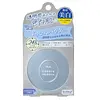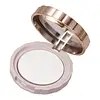What's inside
What's inside
 Key Ingredients
Key Ingredients

 Benefits
Benefits

 Concerns
Concerns

 Ingredients Side-by-side
Ingredients Side-by-side

Aluminum Starch Octenylsuccinate
AbsorbentPentaerythrityl Tetraethylhexanoate
EmollientCellulose
AbsorbentZinc Myristate
Lauroyl Lysine
Skin ConditioningSilica Dimethyl Silylate
EmollientPhytosteryl/Octyldodecyl Lauroyl Glutamate
Skin ConditioningPentylene Glycol
Skin ConditioningPhenoxyethanol
PreservativeParfum
MaskingMethylparaben
PreservativeTocopherol
AntioxidantWater
Skin ConditioningSilica
AbrasiveButylene Glycol
HumectantAlgin
MaskingHydrolyzed Hyaluronic Acid
HumectantMaltodextrin
AbsorbentLactobacillus
Skin ConditioningSodium Hyaluronate
HumectantHydroxypropyltrimonium Hyaluronate
Scutellaria Baicalensis Root Extract
AstringentAnthemis Nobilis Flower Extract
MaskingRosa Damascena Flower Extract
MaskingCitric Acid
BufferingSoluble Collagen
HumectantSodium Citrate
BufferingTalc
AbrasiveSynthetic Fluorphlogopite
CI 77492
Cosmetic ColorantAluminum Starch Octenylsuccinate, Pentaerythrityl Tetraethylhexanoate, Cellulose, Zinc Myristate, Lauroyl Lysine, Silica Dimethyl Silylate, Phytosteryl/Octyldodecyl Lauroyl Glutamate, Pentylene Glycol, Phenoxyethanol, Parfum, Methylparaben, Tocopherol, Water, Silica, Butylene Glycol, Algin, Hydrolyzed Hyaluronic Acid, Maltodextrin, Lactobacillus, Sodium Hyaluronate, Hydroxypropyltrimonium Hyaluronate, Scutellaria Baicalensis Root Extract, Anthemis Nobilis Flower Extract, Rosa Damascena Flower Extract, Citric Acid, Soluble Collagen, Sodium Citrate, Talc, Synthetic Fluorphlogopite, CI 77492
Talc
AbrasivePolymethyl Methacrylate
Cetyl Ethylhexanoate
EmollientSqualane
EmollientPolyethylene Terephthalate
Zinc Laurate
Silica
AbrasiveIsostearyl Sebacate
Skin ConditioningEthylparaben
PreservativeMethylparaben
PreservativeDisodium Stearoyl Glutamate
CleansingStearyl Glycyrrhetinate
Skin ConditioningAluminum Hydroxide
EmollientSodium Hyaluronate
HumectantSodium Acetylated Hyaluronate
HumectantHydrolyzed Hyaluronic Acid
HumectantIron Oxides
Mica
Cosmetic ColorantTalc, Polymethyl Methacrylate, Cetyl Ethylhexanoate, Squalane, Polyethylene Terephthalate, Zinc Laurate, Silica, Isostearyl Sebacate, Ethylparaben, Methylparaben, Disodium Stearoyl Glutamate, Stearyl Glycyrrhetinate, Aluminum Hydroxide, Sodium Hyaluronate, Sodium Acetylated Hyaluronate, Hydrolyzed Hyaluronic Acid, Iron Oxides, Mica
Ingredients Explained
These ingredients are found in both products.
Ingredients higher up in an ingredient list are typically present in a larger amount.
Hydrolyzed Hyaluronic Acid is a form of hyaluronic acid. It is created by the hydrolysis of hyaluronic acid with a high molecular weight. Once created, Hydrolyzed Hyaluronic Acid has a low molecular weight.
Low molecular weight HA has been shown to hydrate and increase elasticity of the skin. Increasing elasticity is also associated with reduction of wrinkle depth.
One study found topical low molecular weight hyaluronic acid may be considered for the treatment of rosacea in the adult population. However, we always recommend speaking with a professional about your skin concerns.
Hyaluronic acids are a humectant. This means they draw moisture from the air. Hyaluronic acids help moisturize, soothe, and protect the skin.
Read more about other common forms of hyaluronic acid:
Learn more about Hydrolyzed Hyaluronic AcidMethylparaben is a preservative and is a paraben. It is used to prevent the growth of fungus, mold, and other harmful bacteria. Parabens are chemicals used as preservatives in both cosmetics and food.
Methylparaben can be synthetically created. It can also be found naturally in some fruits, such as blueberries.
Oftentimes, Methylparaben is combined with other parabens to help increase the shelf life.
The safety of Methylparaben is currently being studied. While ongoing studies are looking into the safety of parabens, the results have been very mixed. Some studies have not found Methylparaben to be harmful.
Learn more about MethylparabenSilica, also known as silicon dioxide, is a naturally occurring mineral. It is used as a fine, spherical, and porous powder in cosmetics.
Though it has exfoliant properties, the function of silica varies depending on the product.
The unique structure of silica enhances the spreadability and adds smoothness, making it a great texture enhancer.
It is also used as an active carrier, emulsifier, and mattifier due to its ability to absorb excess oil.
In some products, tiny microneedles called spicules are made from silica or hydrolyzed sponge. When you rub them in, they lightly polish away dead skin layers and enhance the penetration of active ingredients.
Learn more about SilicaSodium Hyaluronate is hyaluronic acid's salt form. It is commonly derived from the sodium salt of hyaluronic acid.
Like hyaluronic acid, it is great at holding water and acts as a humectant. This makes it a great skin hydrating ingredient.
Sodium Hyaluronate is naturally occurring in our bodies and is mostly found in eye fluid and joints.
These are some other common types of Hyaluronic Acid:
Learn more about Sodium HyaluronateTalc is a clay mineral. It helps absorb moisture and improve the texture of products. Like other types of clay, Talc can have a slight exfoliating effect on skin. Talc can be added to increase the volume of products.
Some Baby powders are made by combining talc with corn starch. The word "talc" comes from Latin and originates from Arabic. Talc is a mineral commonly found throughout the world.
If you have any concerns about using talc, we recommend checking out the FDA's official page.
Learn more about Talc